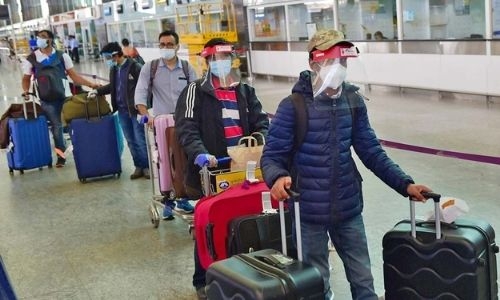100,297 Kerala expats left Bahrain during pandemic
TDT | Manama
The Daily Tribune – www.newsofbahrain.com
Staff Reporter
Over 100,000 expatriates from the South Indian state of kerala left Bahrain during the pandemic period, according to a study conducted by a leading economist. The study titled ‘Covid-19 Pandemic and Exodus of Keralite Migrant Workers from the Gulf’ conducted by leading Indian economist and social scientist Dr B A Prakash focused on return emigration in Kerala.
Among 1,471,000 returnees from Gulf countries, majority were from Saudi Arabia (50 per cent), followed by the UAE (19pc), Qatar (11pc), Oman and Bahrain (7pc) and Kuwait (6pc). The economist pointed out that the loss of income and fall in consumption and other expenditure of the families resulted in a recession in the local economy.
“Most of the sample returnees (54pc) who returned on leave could not return due to COVID-19 disruptions. Of the total returnees from Saudi Arabia, 58pc returned on leave but stranded in Kerala,” the study says. “Majority of the sample returnees from Oman, Kuwait and Qatar came on leave but were not able to return. Nearly one-third of sample returnees lost their jobs due to the closure of companies and business units.
“Most of the returnees had worked in the Gulf countries for more than ten years and they were forced to return to Kerala due to the COVID-19 pandemic. They were unsure of returning to the country in which they worked.“Saudi Arabia has been following Nitaqat or nationalisation policy since 2011. Due to this a large number of Indian emigrants were forced to return. Now Saudi Arabia is following vision 2030 aims to reduce dependence on migrant workers.
“The Saudi Arabia also increased the fee for resident permit, work permit, resident renewal fees etc to a very high level to discourage foreign workers.“International travel restrictions, difference in vaccine policies, recruitment of migrant workers from other countries to replace returned Keralite migrant workers are other reasons.”
The study found that 71 per cent of the sample return migrant workers are unemployed after return. “The rest of the returnees work as casual workers, engaged in small trade or business and work as autorickshaw drivers. 88pc of the sample returnees said that emigration is a better option than finding a job in Kerala and the main problem is lack of regular and remunerative jobs.
“They are keen to emigrate to a foreign country because they can get a regular and remunerative job with reasonable savings and prospects for regular sending of money to their families,” the study says.
The study found that more than one fifth of the returnee households belonged to BPL category. It is reported that 57 per cent of the households possessed an area of land less than 10 cents.
“Majority of households surveyed had incurred debts and the major purposes of borrowing are construction of house, purchase of vehicle and purchase of land,” said Dr Prakash.
He said the COVID-19 pandemic has resulted in an acute recession, large scale return of emigrant workers, contraction of secondary and tertiary sector production and employment. “It resulted in an addition of workers (return emigrants) to the local labour market, created an excess supply of labour force, a spurt in the unemployment rate of secondary and tertiary sector workers and severely restricted occupational and geographical mobility and migration of labour.”
Indian Economist and Social Scientist Dr B A Prakash
Related Posts


